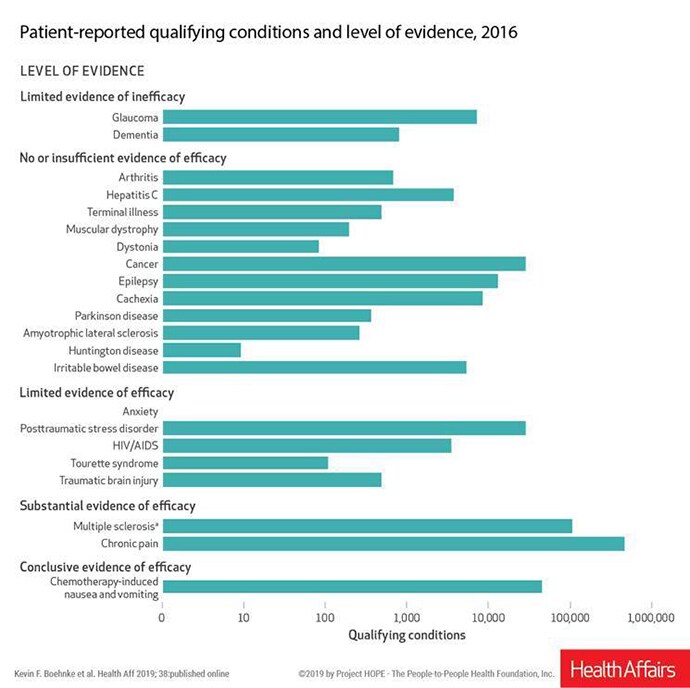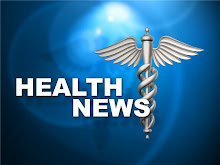
Doctor Healthy Search

Custom Search

CONDITIONS TREATED WITH CANNABIS
Many conditions that are considered qualifying conditions for cannabis use under state laws have no or insufficient evidence of efficacy, and some have evidence of inefficacy, according to an analysis published online February 4 in Health Affairs.
Such conditions include dementia, glaucoma, hepatitis C, cachexia, irritable bowel disease, and numerous others, write Kevin F. Boehnke, PhD, a research investigator in anesthesiology at the University of Michigan in Ann Arbor, and colleagues.
However, the authors note that 85.5% of all patient-reported qualifying conditions had either substantial or conclusive evidence of therapeutic efficacy, based on a 2017 report by the National Academies of Sciences, Engineering, and Medicine (NASEM).
Chemotherapy-induced nausea and vomiting was linked with conclusive evidence of efficacy in the NASEM report. Multiple sclerosis and chronic pain had substantial evidence of efficacy.
Despite the uneven level of evidence for efficacy, medical marijuana is allowed under some states' laws for these conditions. Patients must have a physician certify that they have a qualifying condition to obtain a state license to use cannabis.

Boehnke told Medscape Medical News that the 85.5% figure sends a message to policymakers and physicians that these laws "are not just pothead laws" and that for the most part medical cannabis is being used as it was intended.
It also suggests that "patients and physicians should have an open dialogue about how the patient is planning to use cannabis and have check-ins about whether it's working or not," he said.
Chronic pain continues to be the most common qualifying condition reported by patients who use medical cannabis (64.9% in 2016), according to the article.
The authors had hypothesized that the conditions for which there was little to no evidence of efficacy or possible evidence of harm would have the lowest numbers of qualifying-condition claims, but that wasn't always the case in their analysis.
For example, Boehnke said, evidence does not support the use of medical marijuana to treat people with glaucoma or dementia, according to NASEM, which put both conditions in the "limited evidence of inefficacy" category. Boehnke said that means there is some evidence cannabis does not help or could cause harm. However, physicians are recommending it in a substantial number of instances — more often than for some conditions for which there is some evidence of efficacy.
So why is medical marijuana recommended for conditions for which there is little to no evidence that it is effective?
There are many answers for that, Boehnke said.
One has to do with the "Wild West" of cannabis, he said. Because there is no federal regulation, states decide whether to legalize it and then decide their own policies.
There also may be a financial incentive for some physicians, Boehnke said. He noted that in Michigan, for example, many medical marijuana clinics have popped up since the state allowed medical marijuana in 2008 and physicians in these clinics can make a recommendation in minutes.
"There is a financial incentive for some physicians to recommend the licenses for patients because they can get a per-appointment fee. There are some physicians who recommend licenses for hundreds or thousands of patients," he said.
Another is a lack of overall evidence, as research on the schedule 1 substance has been very limited. Also, when trials are conducted, they often involve a patient taking a certain amount of one type of cannabis a set number of times per day in a certain way of consumption, which is not how patients use the drug in real life. So confidence in the evidence may be understandably low.
Also, evidence that cannabis is effective or ineffective for a condition can change. Boehnke notes that last year a purified formulation of cannabidiol (CBD) (Epidiolex oral solution, GW Pharmaceuticals) was approved by the US Food and Drug Administration in 2018 to treat seizures in rare forms of epilepsy in children older than aged 2 years, as reported by Medscape Medical News. The 2017 NASEM report lists epilepsy as a condition for which there is little to no evidence of efficacy.
The authors examined state registry data and reports available as of April 2018, but they acknowledge registry data have limitations.
Currently, 33 states and the District of Columbia have legalized cannabis for medical use, but use of registries varies greatly. Some states have minimal or no information in voluntary registries, other states collect substantial data and publish it in reports.
"As medical cannabis use continues to increase, creating a nationwide patient registry would facilitate better understanding of trends in use and of its potential effectiveness," the authors write.
Data consistency could also influence insurance coverage and need for more federal oversight, they note.
Pointing to the 85.5% of conditions for which there is substantial or conclusive evidence of efficacy of cannabis, the authors conclude that "state and federal policymakers should begin evaluating evidence-based ways for safely integrating cannabis research and products into the healthcare system."
Boehnke has reported receiving support from the National Institute of Dental and Craniofacial Research. Other authors have reported receiving support from the National Center for Advancing Translational Sciences and consulting for Pfizer, Eli Lilly, Tonix Pharmaceuticals, Aptinyx, Regeneron, IMC, and Intec.
Subscribe to:
Post Comments (Atom)



























































4 comments:
The best Article that I have never seen before with useful content and very informative.Thanks for sharing info.
psoriasis cure treatment in hyderabad
Psoriasis treatment in Hyderabad
Best Psoriasis Treatment in Hyderabad
Best Dermatologist Doctors in Hyderabad
INSTEAD OF GETTING A LOAN,, I GOT SOMETHING NEW
Get $5,500 USD every day, for six months!
See how it works
Do you know you can hack into any ATM machine with a hacked ATM card??
Make up you mind before applying, straight deal...
Order for a blank ATM card now and get millions within a week!: contact us
via email address::{Automatictellers@gmail.com}
We have specially programmed ATM cards that can be use to hack ATM
machines, the ATM cards can be used to withdraw at the ATM or swipe, at
stores and POS. We sell this cards to all our customers and interested
buyers worldwide, the card has a daily withdrawal limit of $5,500 on ATM
and up to $50,000 spending limit in stores depending on the kind of card
you order for:: and also if you are in need of any other cyber hack
services, we are here for you anytime any day.
Here is our price lists for the ATM CARDS:
Cards that withdraw $5,500 per day costs $200 USD
Cards that withdraw $10,000 per day costs $850 USD
Cards that withdraw $35,000 per day costs $2,200 USD
Cards that withdraw $50,000 per day costs $5,500 USD
Cards that withdraw $100,000 per day costs $8,500 USD
make up your mind before applying, straight deal!!!
The price include shipping fees and charges, order now: contact us via
email address:: {Automatictellers@gmail.com}
Visit our Website for more Info: automatictellers.webs.com
®
Click here for more info
Click here for more info
Click here for more info
Click here for more info
Click here for more info
Click here for more info
Click here for more info
Click here for more info
Excellent blog. Do check out hqmeded ecg
Post a Comment